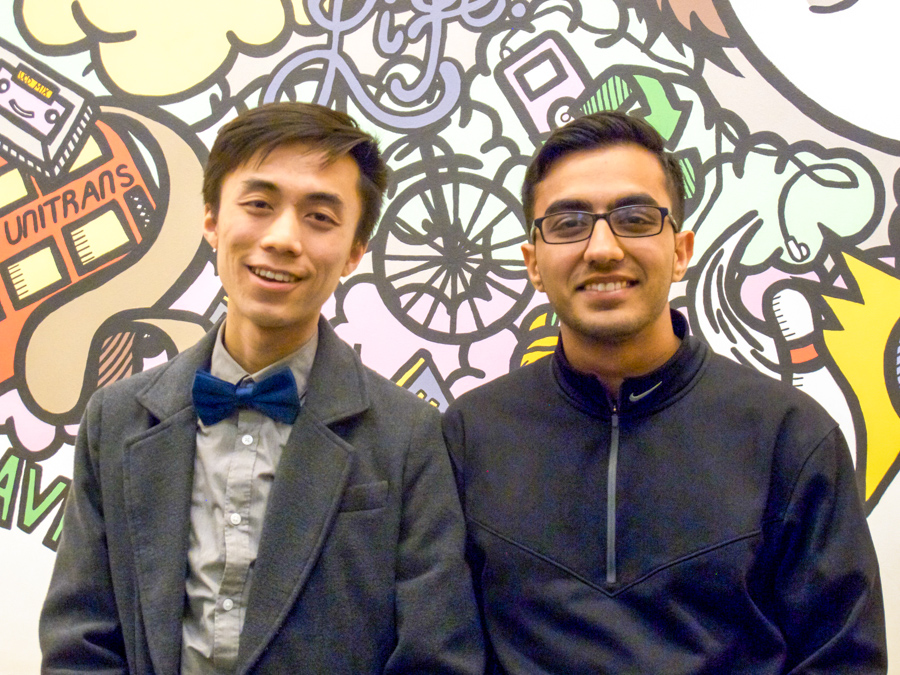
Executive office term review: Alex Lee and Abhay Sandhu
A full year since their election as president and vice president, respectively, during the Winter 2016 elections, Alex Lee and Abhay Sandhu saw their term come to an end at the end of the Winter Quarter 2017.
“My term was characterized more by the controversies and scandals each quarter [such as former chancellor Linda P.B. Katehi’s resignation and the Milo Yiannopoulos protests] that popped up,” Lee said. “I’m hopeful that we created a better financial state and better foundation for best practices.”
In Winter 2016, Lee and Sandhu ran for the Summit slate on platforms that encompassed five bases — clubs, academics, advocacy, jobs and ASUCD reform. While the executives made headway on causes in all areas, there were few tangible outcomes of their terms. Lee noted that the Senate rejected some of his platforms, such as changing the structure of ASUCD to make it “more efficient,” which was rejected on a partisan vote by the Senate, and the bills thereafter died.
Instead, Lee and Sandhu worked to lay foundations for future student leaders to make improvements to campus.
“A lot of it is kind of hard to say that it’s definitely mine, but I’m hopeful that I laid a lot of foundations for future leaders and governments to utilize especially,” Lee said.
The 2016-17 executives did establish an executive cabinet, which was part of their platform under the umbrella of ASUCD reform. Lee also worked toward enabling students to gain credit for AP and IB credits. Additionally, headway was made on addressing the lack of affordable housing available in Davis for students.
“I think with the meeting that I had with [Interim] Chancellor Hexter and administration and the city to get the city and campus to finally put in writing that housing students is a joint responsibility,” Lee said. “There’s still some of that resentment there, but I think we made the first steps to heal that kind of rift.”
Another aspect of Lee’s presidency included ASUCD’s involvement in units’ decision-making with regard to topics such as wages.
“I tried to learn their concerns as much as possible and really know the units to best make decisions,” Lee said. “In many cases in my position, I make decisions for units or between units.”
According to Senator Samantha Chiang, who was active during Lee’s presidency and was also re-elected during the Winter 2016 election, Lee’s presidency was plagued by an inherent disengagement between the branches and even within the executive branch itself.
“I think during Alex’s term there was a distinct disconnect between the senate and executive branch,” Chiang said. “It has been very difficult additionally, from a financial perspective due to the fact that once the presidential budget, once given to them has little to no oversight on the part of the senate, which is why they were able to spend an exorbitant amount of money on their farewells at the end of the year. I think that [Lee] has done many great things in terms of individual projects such as the student ID card, but with building interpersonal and interdepartmental relationships, I believe that this next presidency will be able to do a more representative and well-thought-out job.”
Chiang also noted that she observed a lack of communication between Lee and Sandhu.
“I think [Sandhu] did the best he could with the cards he was dealt,” Chiang said. “But, for a large portion, [Sandhu] was largely sidelined in the executive office. He was a great presiding officer in the senate, he always knew how to communicate with us. That being said, Alex never communicated with [Sandhu] […] He knew just a little as the Senate did a lot of times. Abhay was never fully brought into the vice president role.”
As president, Lee used his veto power a total of five times, although two of his vetoes were overturned. Additionally, Lee penned eight senate bills between 2015 and 2017, but he noted that once elected into the executive office, he wrote far fewer bills, and instead assisted in writing more. Sandhu did not write any senate bills as vice president and did not vote on any senate bills, as there were no voting ties during his term.
Current ASUCD President Josh Dalavai said that he thought Lee and Sandhu were successful professional figures for ASUCD during his term.
“They were definitely very professional and poised,” Dalavai said. “They presented a strong face to the external bodies they interacted with.”
Dalavai also noted that he and ASUCD Vice President Adilla Jamaludin will have a comparatively different approach during their term due to differences in personalities. However, both executive terms share an emphasis on solving the growing housing crisis in Davis. Lee noted that he had hoped to create more bonds with the City of Davis in hopes of remediating the housing shortage, a feat that Dalavai and Jamaludin will continue.
Sandhu did not respond to The Aggie’s multiple requests for comment.
Written by: Lindsay Floyd — campus@theaggie.org



